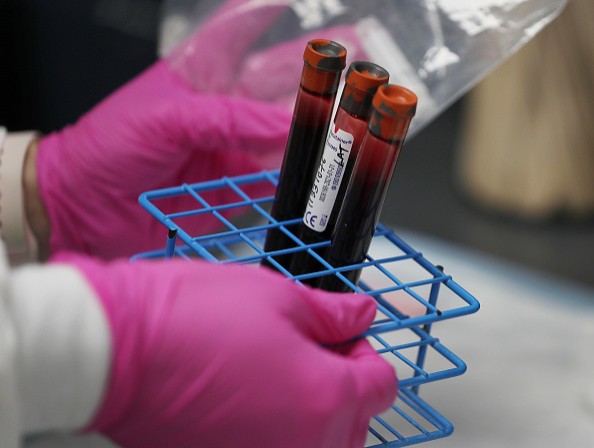COVID-19 May Be in Your Blood If Body Exhibits These Scary Signs
One of the most common effects of COVID-19, a respiratory illness, is severe damage to the lungs that makes it difficult for a person to breath or even impossible to breath, especially to those who are severely affected by the virus.
There is also mounting evidence that the novel coronavirus affects the blood as well.

According to an MSN report, here are some of the warning signs that COVID-19 is in your bloodstream.
Numbness or unusual swelling
In a recent study published in Thrombosis Research, blood clotting was found to be dangerous due to the simple fact that it can stop blood flowing in the body. Some of the COVID-19 patients, such as late Broadway actor, Nick Cordero, were forced to undergo amputation because of "thrombotic events."
The Thrombosis Research found that 315 of the 184 COVID-19 patients suffered thrombotic complications. Thrombosis is the formation of a blood clot, known as a thrombus, within a blood vessel. It prevents blood from flowing normally through the circulatory system. One of the first signs you are experiencing blood clots is if your fingers or limbs start feeling any pain, numbness, or swelling.
Deep Vein Thrombosis (DVT)
Many COVID-19 patients worldwide are also suffering from a condition called deep vein thrombosis (DVT). The American Heart Association explained that blood clots could form in the veins deep in the limbs. The condition usually impacts the deep veins of the legs.
A blood clot in a deep vein can break off and travel through the bloodstream. The condition is called pulmonary embolism if the clot travels to the lungs and blocks the flow of blood.
COVID-19 patients notice changes to their toes
Some of the young COVID-19 patients reported discolored, swollen lesions on their toes. Medical experts dubbed this condition as "COVID toes." Cleveland Clinic pulmonologist Dr. Humberto Choi explained via the medical center's website that it is possible to have a skin reaction caused by a small clog or micro clots in the blood vessels typically found in the toes.
Strange rashes or discoloration of the skin
Many physicians observed skin manifestations such as strange rashes and discoloration, amongst COVID-19 patients. The American Academy of Dermatology keeps a symptom registry to record, research, and hopefully explain why the virus manifests itself in the skin.
Dr. Alisa Femia, director of inpatient dermatology and a specialist in autoimmune connective tissue disease at NYU Langone, told TIME that the preliminary research implies blood-flow problems might be the reason for the bizarre skin conditions.
Experiencing Blood Clots
Doctors worldwide reported abnormal blood clotting in COVID-19 patients, especially those who are in severe conditions. Jeffrey Laurence, MD, a hematologist at Weill Cornell Medicine in New York City, told CNN that the number of clotting problems he sees in the ICU, "all related to COVID-19, is unprecedented."
Laurence added that blood clotting issues appear to be widespread in severe COVID-19 cases. Yet, Laurence noted that it is still unclear how exactly the virus results in blood clots. He said the condition may have something to do with pre-existing conditions, such as diabetes, high blood pressure, or heart disease.
Blood clots fill the lungs
Lancet Respiratory Medicine published a new study showing that blood clots clog the lungs of African American COVID-19 patients. Richard Vander Heide, MD, head of pathology at LSU Health New Orleans School of Medicine and head of the study, said they "found that the small vessels and capillaries in the lungs were obstructed by blood clots and associated hemorrhage that significantly contributed to decompensation and death in these patients."
All 10 individuals involved in the study, whose bodies were examined during an autopsy, showed that they suffered underlying conditions such as obesity, diabetes, and high blood pressure that worsen the infection.
Experience stroke
COVID-19 patients of any age had been reported of experiencing strokes, and experts believed it has to do with blood clotting. Many of the patients have no pre-existing heart-related conditions that could make them prone to a stroke. Patients have also not shown any other coronavirus symptoms when the stroke occurs.
"We're seeing a startling number of young people who had a minor cough, or no recollection of viral symptoms at all, and they're self-isolating at home like they're supposed to - and they have a sudden stroke," Adam Dmytriw, MD, a University of Toronto radiologist, told the New York Times.
Heart attack or other heart damage
The Washington Post reported that blood clots could damage a patient's heart, and the COVID-19 could weaken the heart's muscle. Thus, a COVID-19 patient could have dangerous arrhythmias and heart attacks because of the small clots.
Check these out:
Covid-19 Cases in US Nursing Homes Increase by Nearly 80% Earlier This Summer
COVID-19 Latino Patient Recovery: A Miracle After Beating the Virus, Two Blood Clots, and a Stroke
Subscribe to Latin Post!
Sign up for our free newsletter for the Latest coverage!

















